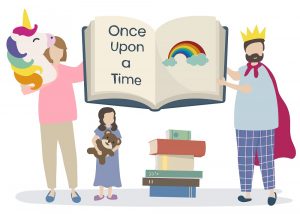Think you need to be a literacy expert to nurture vocabulary growth in your kiddo? Think again! In fact, if you are looking for exciting and innovating strategies to help build your child’s vocabulary, these tips may not be what you are expecting. Many of the ways we help our children develop a large vocabulary is by simply spending time with and talking to them. In fact, you will find that most of these activities are also just good bonding experiences and good fun!

Reading
Yep, here is yet another reason our kids must be read to and be reading. Exposing children to the written word is one of the best gifts you can ever give. Among its numerous benefits is introduction to new words. Reading and being read to allows kids to become familiar with words they may not otherwise be exposed to and in turn produces a robust vocabulary. When it comes to language building, absolutely nothing beats reading!
Singing
If you’re like me, your singing voice may leave a lot to be desired; but don’t let that stop you from singing to your kids. Simple songs such as Twinkle, Twinkle Little Star and The Itsy, Bitsy Spider are not only fun to hear, but they also expose your little one to words (twinkle and itsy bitsy) that they might not otherwise hear. So, go ahead and belt out that tune with your kiddo as you run errands. You’re not just having fun, you’re building vocabulary!
Family Conversation
In our busy culture it can be challenging to find time to just hang out together as a family and talk, but this simple activity really does have a huge positive impact. When we gather as a family and discuss our day and our plans it exposes the younger ones among us to new words. As a mom of four kids of varying ages, I can attest that meal time conversation often includes the question, “What does that mean?” Now, I admit that sometimes this is followed by a warning glance in my teenagers’ direction (a reminder they have a younger sibling listening!) But most of the time it involves a simple and innocent explanation. Listening to conversation also helps little ones fit words into context, which is also a valuable vocabulary building skill.
Word Games
Older preschool and elementary aged children can grow their vocabulary by playing different word games. Crossword puzzles, Mad-Libs, and word searches are just a few fun activities that help develop language. Be willing to think outside the box as you provide these experiences. Phone and tablet apps are great and easy vehicles for delivering these games. Family game night is also a good opportunity to interact with words. Bananagrams, Scrabble, Boggle, Upwords and Word on the Street are a few examples of board games that are not only fun but also educational. A quick Google search will yield many more word-themed games from which to choose.
Story Telling
While reading is important, it isn’t the only way to expose children to a good tale. Whether make-believe or real, kids love to be told stories. So try changing things up at bedtime and weave a fun once-upon-a-time yarn. More than likely, your little one will jump in and add his two cents worth to the story. This is just the kind of creative process that nurtures vocabulary growth.
As you can see, most vocabulary acquisition is gained through simple exposure. However, simple doesn’t always mean easy. It takes some effort to make these experiences happen. Let’s determine to put some of these simple but important pursuits into action this week. By doing so, we will not only help nurture vocabulary development, but we will also build bonds, develop other literacy skills and have fun! Interested in other vocabulary activities? Check out our Pinterest board, Vocab Ventures.


